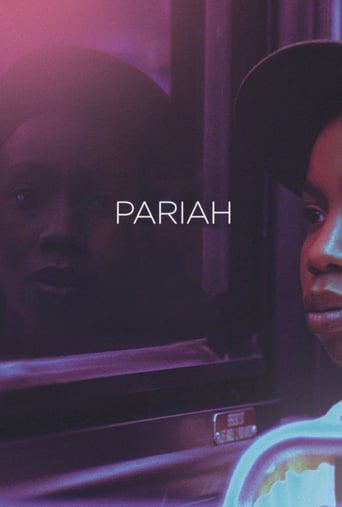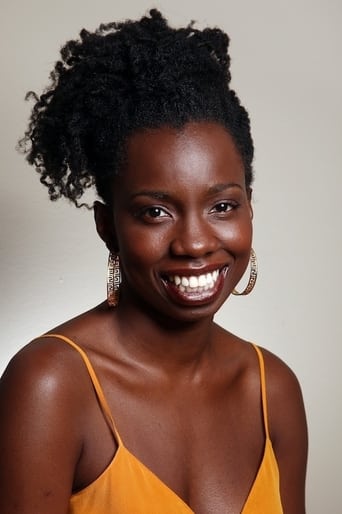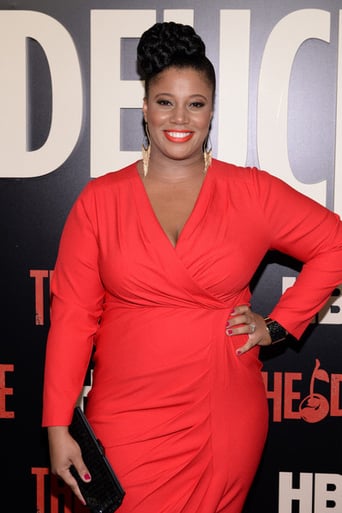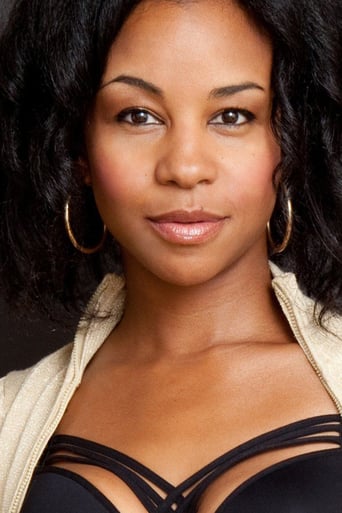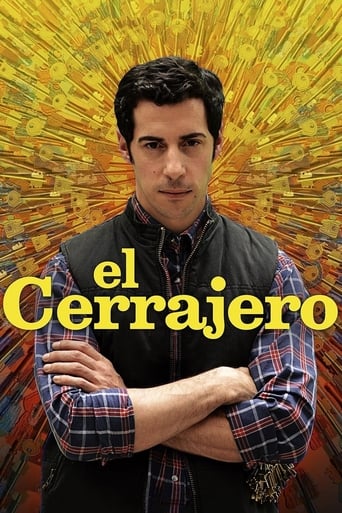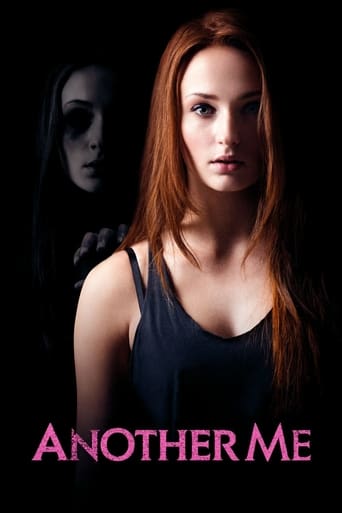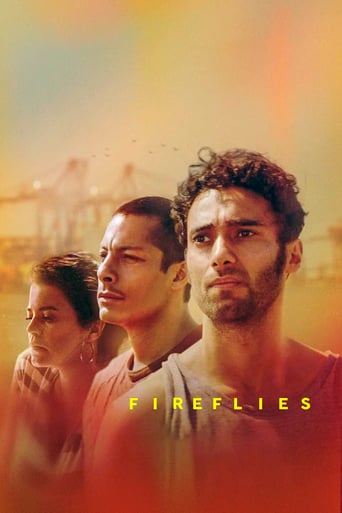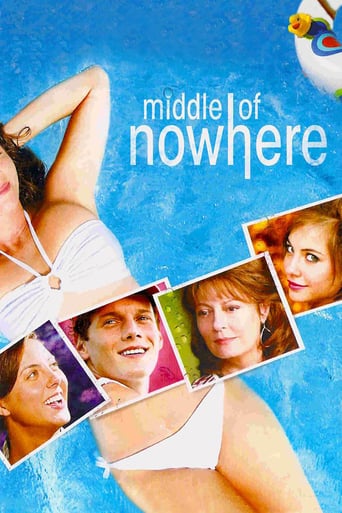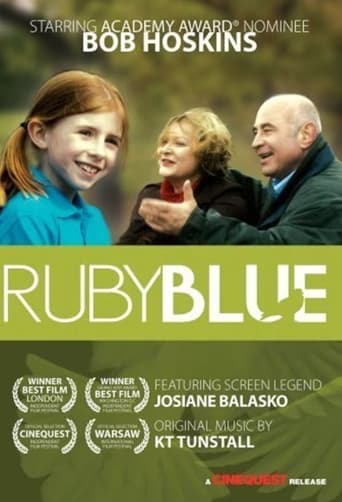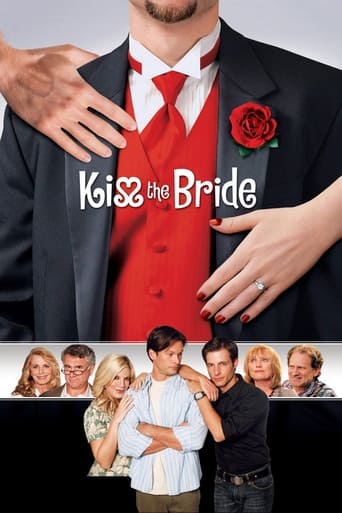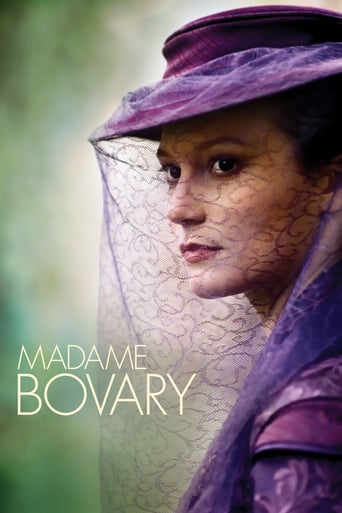Pariah (2011)
A Brooklyn teenager juggles conflicting identities and risks friendship, heartbreak, and family in a desperate search for sexual expression.
Watch Trailer
Cast


Similar titles
Reviews
This movie turned out to be pretty good. Quality black dramas are so rare and this one definitely didn't disappoint. The script was well executed and the scenes seemed to piece together like falling dominoes, rather than a jigsaw puzzle with numerous elements missing. Alike is the main character who struggles with being what she considers her true self. Her domineering mother and the opinions of society causes her to repress who she is, a gay female who enjoys dressing like a guy. The agony of not being able to express her true self shows throughout her body language and face and I thought that was pretty good acting. Alike's mother specifically represented society who represses people's right to freedom through rules and moral codes. Alike's father is clearly having an affair but the mother struggles to ignore it, wanting to maintain her made up happy life. Her choice of ignorance symbolizes society's quest to ignore the realities, of what's truly real about people. The pacing and execution of this film reminded me of something Spike Lee would do.
Writer/Director Dee Rees is an inordinately talented newcomer. If PARIAH is indicative of the quality of films she will create, then we are in for a new level of verismo cinema. She tackles a tough subject - same sex relationships among African American women - with such insight and care to details that her film jumps off the screen screaming as in the words of her heroine 'I'm not running - I'm choosing': lesbian girls are not God's mistake (to quote the mother figure) but instead have the courage to accept their difference and embrace their sexuality and still become successful members of society.Alike/Lee (Adepero Oduye, a fine young actress who hails from Brooklyn by way of Nigeria, a graduate of Cornell University who has studied acting with Wynn Handman, Austin Pendleton, and Susan Batson) is a 17-year old sexually conflicted girl who lives in Brooklyn with her younger very bright sister Sharonda (Sahra Mellesse) and her parents - police detective father Arthur (Charles Parnell) and conservative, overprotective, biased mother Audrey (Kim Wayans). Alike is an excellent student, a blossoming poet, and a lesbian: she maintains tow life styles complete with clothes changes so that she can be the 'daughter' at home and herself outside the home. Alike's best friend Laure (Pernell Walker) is her support system as Laure is comfortable about being out as a lesbian. Alike's home life is strained as her ever arguing parents disagree on many factors, on of them being Alike's need to appear like a man. Audrey arranges for Alike to become friends with Bina (Aasha Davis) who is the daughter of one of Audrey's friends, an encouragement that eventually leads to Alike's surprise first sexual experience with a girl who is just 'doing her own thing' - ie, not a lesbian. This deeply affects Alike, she delves more deeply into her poetry and graduates early because of her shining school record. At a point of no return she is confronted by her parents and the manner in which she makes her decision as to 'run or choose' provides the ending of the story.The cast is uniformly strong and though Adepero Oduye makes a show-stopping debut, the other actors are equally superb. Bradford Young is the cinematographer who helps create the atmosphere. The dialogue is delivered in street language and is often covered with shouting and with multiple characters talking simultaneously: subtitles help here. But the genius of the film is in the concept and the courage and in the amazing gift for creating meaning cinema that comes across as the work of Dee Rees. She is a talent to watch. Grady Harp
"It's not a phase, there's nothing wrong with me." Teenager Alike (Oduye) is struggling with who she is. At home she tries to be the woman her mother and father want her to be. Away from home she tries to be herself. Leading the double life is starting to wear "Li" down and she uses her writing to help release the emotions out that she holds. To be honest I wasn't really looking forward to this one. The preview made the movie look OK but I was still expecting it to be a little boring. I was dead wrong. Almost from the beginning you feel a connection with "Li" and throughout the movie that only grows. The acting is excellent in this and Kim Wayans (yes, that Kim Wayans) give a performance that is almost better the Mo'Nique's in "Precious". This movie is comparable to that one in a lot of ways. I will say that this movie is easier to watch and in my opinion better the "Precious". Very moving and real. One of the bigger surprises I have had watching a movie lately. Overall, if you liked "Precious" you will love this movie. I give it an A.
'Pariah' is the feature length expansion of a short film created by Dee Rees, presented at the Sundance Festival in 2007. It's basically a coming of age story focusing on a middle-class, black Lesbian teenager, Alike, played by Adepero Oduye. The title 'Pariah', is a bit of a strong epithet to describe Alike's situation, as she's mainly an outcast in the eyes of her mother Audrey (Kim Wayans), a devout Christian, who can't stomach the idea that her daughter is not really interested in men.'Pariah' is uniformly well-acted with a slow-moving plot that holds few surprises. In fact, take away the black middle-class environment and you'd be left with pretty much your ordinary 'coming out' tale of a conflicted gay teenager. All the stock characters are there including the 'villain' of the piece, the aforementioned intolerant mother as well as the more sympathetic police detective father, Arthur, who's not crazy about his daughter's choice of sexual orientation but still holds a special place in his heart for 'daddy's girl'. Also in the mix is Alike's best friend, Laura, who enjoys hanging out at 'rough' Lesbian clubs but eventually decides to get her GED. While Alike still enjoys a bond with one parent, Laura is not on speaking terms with her mother, who shows no interest when Laura rings her doorbell and informs her that she's passed her GED.Eventually, Alike's Mom introduces her to Bina, the daughter of one of her colleagues at work (strikingly played by Aasha Davis). The Mom finds Bina much more acceptable since she comes from a more upper class environment than what she regards as the lower class world Laura comes from. Bina invites Alike over to her house and makes it clear that she's interested in having an intimate encounter. At first Alike admits the proposition makes her uncomfortable but on a 'second date', the proposed tryst is consummated. The twist is that Bina is merely bi-curious and Alike is sorely disappointed that she won't be having an extended relationship with her for the foreseeable future. Alike's reaction is predictable: a full-scale meltdown where she trashes her own room.'Pariah' concludes also on a predictable note. Alike's Mom again chastises her for disappearing and then the parents argue over the mother's suspicion that the father has been having an affair. Alike declares her independence when she reveals to her father that she's been accepted into a creative writing program and asks his permission to sign papers so she can leave home.I suspect that deep down, 'Pariah' has garnered so many accolades not because it's a great film, but precisely because critics wish to encourage the film's creator, Ms. Rees, who apparently has much more talent as a director than a screenwriter. In terms of the writing, perhaps Ms. Rees' strongest suit is dialogue, which has a realistic, gritty feel to it. I also liked her choice of alternative rock for the soundtrack, instead of loud, rap music, which is the type of music one would expect to find in a drama of this kind.'Pariah' is a well-crafted first feature effort. You'll find very good acting here and a story that will pretty much hold your interest to the end. Nonetheless, I didn't find myself invested enough in the protagonist's journey to end up raving about the film as so many others have done. By film's end, with Alike's decision to branch off on her own, my reaction was, "okay, that's nice!" In essence, the filmmaker is saying that those who have been ostracized in society need to go forward in spite of all the criticism. But most young people must go through obstacles in order to achieve independence. Were Alike's difficulties in 'coming of age', that much different than other teenagers? Not really. Hence, I didn't feel I was watching something so 'different' or 'out of the ordinary'. It's up to Ms. Rees to next take on a project that goes beyond the world that she knows so well about and is comfortable with.

